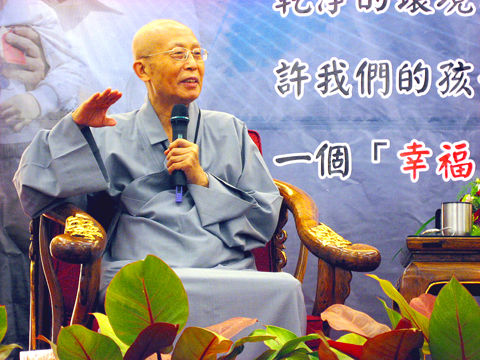Buddhist Master Sheng Yen (聖嚴法師), founder of the Taipei-based Dharma Drum Mountain Culture and Education Foundation, died at 4pm yesterday at Dharma Drum Mountain in Taipei County’s Jinshan Township’s (金山). He was 79 years old.
On the foundation’s Web site, an announcement said: “Though the Master’s body passed today … Master Sheng Yen has not left us. His preachings touch our daily lives; at this time, what we need most is to calm our hearts and recite Buddha’s name.”
The foundation said Sheng Yen had been battling with chronic kidney ailments and had been on dialysis at National Taiwan University Hospital. After being diagnosed with urological cancer in December, Sheng Yen was hospitalized on Jan. 5.

PHOTO: CNA
The hospital said Sheng Yen voluntarily checked out of the hospital at around 3pm on Monday to return to his temple.
Although Sheng Yen had been advised by the hospital about the option of a kidney transplant, speaking of his illness in 2007, he said he declined the surgery because, “The kidney fails as a function of nature; there is no need to do unnecessary and extra procedures to [prevent it].”
Sheng Yen was named as one of the 50 most influential people in Taiwan’s history by Common Wealth magazine in 1998 and advised politicians, business leaders and celebrities.
Born in 1930 in China’s Suzhou Province, Sheng Yen was tonsured as a monk at the age of 13.
His religious career was interrupted for 10 years when he was drafted into the army during China’s Civil War. He came to Taiwan in 1949 and became a monk again in 1959.
Sheng Yen, who received masters degree and a doctorate in Buddhist literature from Japan’s Rissho University, began to preach to large crowds of followers in 1985 as the founder and the director of the Institute of Chinese Buddhism Study in Peitou (北投), Taipei.
He founded the Dharma Drum Mountain Culture and Education Foundation in 1989, emphasizing attention to techniques to command one’s “mental ways” and “self-extrication.”
The temple went through a 16-year construction process before being opened in 2005 and now has branches worldwide.
One of Sheng Yen’s unfinished legacies is the Buddhist University, a project he announced in 1996 but has yet to receive sufficient funding to establish.
President Ma Ying-jeou (馬英九) paid a visit to Dharma Drum Mountain last night to pay tribute to Sheng Yen.

POLAM KOPITIAM CASE: Of the two people still in hospital, one has undergone a liver transplant and is improving, while the other is being evaluated for a liver transplant A fourth person has died from bongkrek acid poisoning linked to the Polam Kopitiam (寶林茶室) restaurant in Taipei’s Far Eastern Sogo Xinyi A13 Department Store, the Ministry of Health and Welfare said yesterday, as two other people remain seriously ill in hospital. The first death was reported on March 24. The man had been 39 years old and had eaten at the restaurant on March 22. As more cases of suspected food poisoning involving people who had eaten at the restaurant were reported by hospitals on March 26, the ministry and the Taipei Department of Health launched an investigation. The Food and

The long-awaited Taichung aquarium is expected to open next year after more than a decade of development. The building in Cingshui District (清水) is to feature a large ocean aquarium on the first floor, coral display area on the second floor, a jellyfish tank and Dajia River (大甲溪) basin display on the third, a river estuary display and restaurant on the fourth, and a cafe and garden on the fifth. As it is near Wuci Fishing Port (梧棲漁港), many are expecting the opening of the aquarium to bring more tourism to the harbor. Speaking at the city council on Monday, Taichung City Councilor

A fourth person has died in a food poisoning outbreak linked to the Xinyi (信義) branch of Malaysian restaurant chain Polam Kopitiam (寶林茶室) in Taipei, Deputy Minister of Health and Welfare Victor Wang (王必勝) said on Monday. It was the second fatality in three days, after another was announced on Saturday. The 40-year-old woman experienced multiple organ failure in the early hours on Monday, and the family decided not to undergo emergency resuscitation, Wang said. She initially showed signs of improvement after seeking medical treatment for nausea, vomiting and diarrhea, but her condition worsened due to an infection, he said. Two others who

Taiwanese should be mindful when visiting China, as Beijing in July is likely to tighten the implementation of policies on national security following the introduction of two regulations, a researcher said on Saturday. China on Friday unveiled the regulations governing the law enforcement and judicial activities of national security agencies. They would help crack down on “illegal” and “criminal” activities that Beijing considers to be endangering national security, according to reports by China’s state media. The definition of what constitutes a national security threat in China is vague, Taiwan Thinktank researcher Wu Se-chih (吳瑟致) said. The two procedural regulations are to provide Chinese